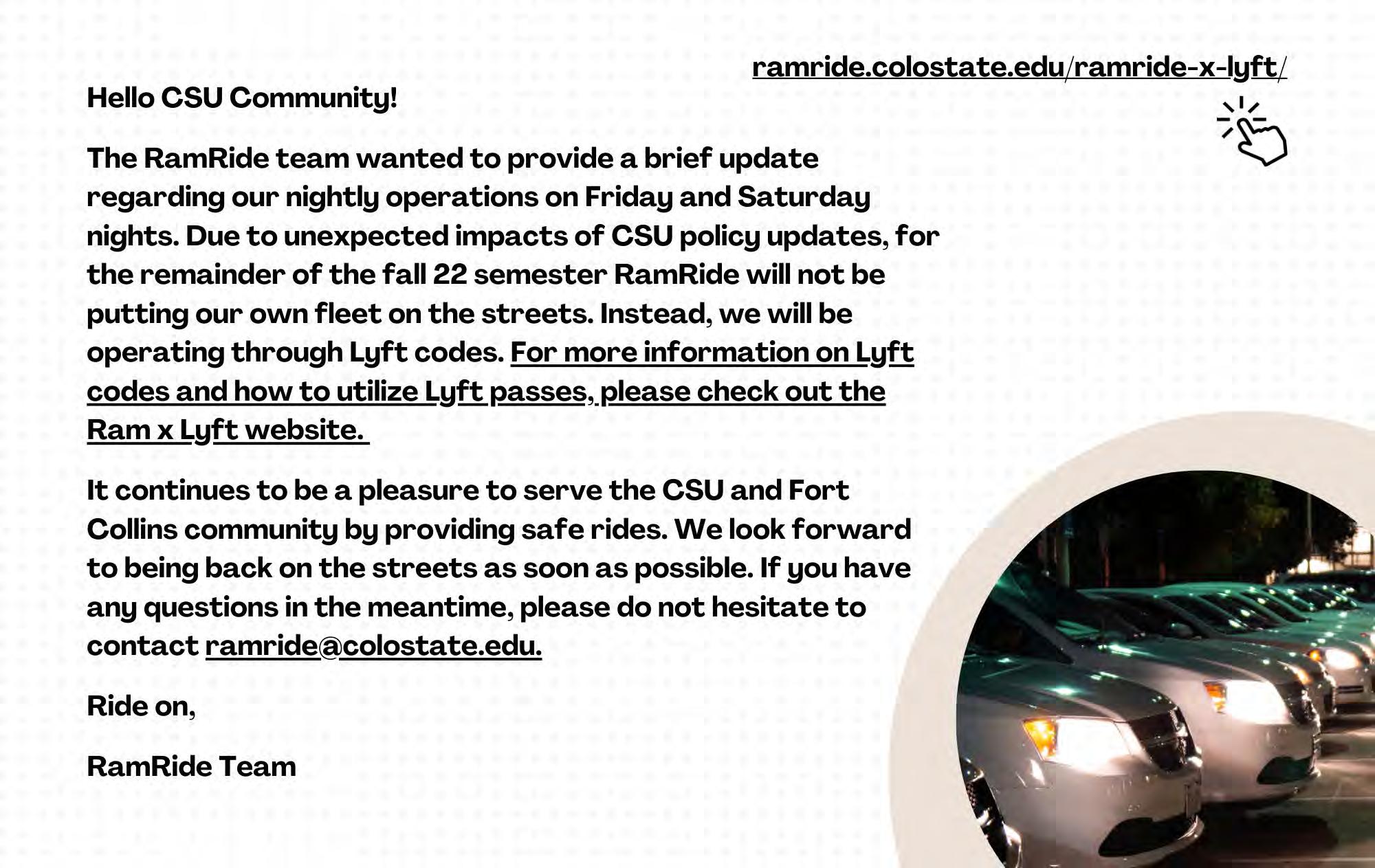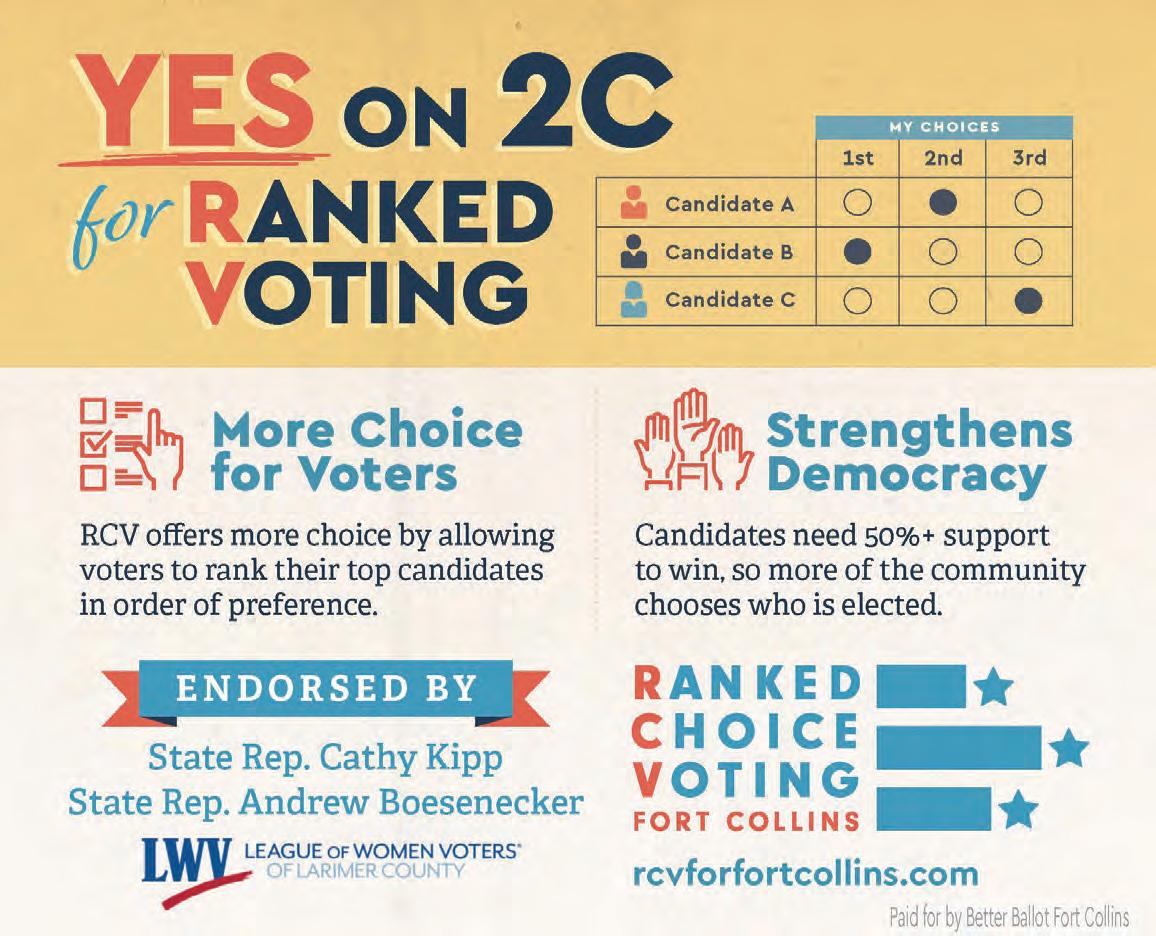
45 minute read
NEWS: Midterm voter guide PAGES
MIDTERM VOTER GUIDE
Representative to the 118th US Congress — District 2
GRAPHIC ILLUSTRATION BY FALYN SEBASTIAN
THE COLLEGIAN By Ivy Secrest
@ivysecrest
Colorado’s second congressional district is currently represented by Democrat Joe Neguse; however, constituents will decide between Neguse and his opponents based on their respective campaigns Nov. 8. Joe Neguse
Joe Neguse is the first Black congressman in Colorado history, elected to his first term in 2018. Neguse prioritizes the issues of climate action, conservation, immigration and gun violence prevention. He serves on the House Judiciary Committee, the House Natural Resources Committee and the House Select Committee on the Climate Crisis.
Neguse has achieved “the recovery of millions of dollars for consumers, investigations culminating in significant financial-fraud cases, the championing of legislation to combat financial fraud against seniors and the launch of the state’s first online filing system for civil rights discrimination complaints,” according to his website. He has worked to protect public lands and address the climate crisis as well as protect constituents. Marshall Dawson
Marshall Dawson, running as a Republican, was raised on a farm in Kentucky, where he experienced “how Americans can flourish when free to determine their destiny,” according to his website.
Dawson is running on the issues of peace, power and prosperity, meaning he intends to take a vested interest in funding programs that prevent school violence adequately, invest in funding a policy to curb the fentanyl crisis and seizure of illegal drugs at the U.S.-Mexico border as well as work to repeal the Patriot Act and reevaluate how Congress spends and makes decisions for the public. Gary Nation
Gary Nation is running with the American Constitution Party. Encouraging voters to look outside the two-party system in order to achieve a representative government, he has observed wealth deeply tying to political success and would like to minimize corruption, repeal the 16th Amendment, implement a replacement amendment “establishing a national financial transactions tax, essentially a broad national sales tax,” according to his Coloradoan article, as well as implement many other financial actions, secure the drug issue at the border and allow student debt to be discharged in bankruptcy like any other debt. Steve Yurash
Steve Yurash is running with the Colorado Center Party because he believes in providing Americans with a third-party option and avoiding the two-party system.
Yurash is looking to readdress crime. He supports adding mental health professionals to the police force and not letting police off the hook when they have mistreated people, as well as making sure criminals aren’t treated as victims and eliminating cash bail. He is also looking to rebalance health care. Tim Wolf
Tim Wolf is running with the Unity Party to provide a balanced option between the left and right parties. He believes in utilizing the community to rebuild the system so people don’t feel like they are wasting their votes.
Reach Ivy Secrest at news@ collegian.com.

MIDTERM VOTER GUIDE
Candidates for US senator
By Sam Hutton
@sam_hut14
The election for the available United States Senate seat in the state of Colorado is underway. Four candidates have been outlined as challengers to unseat incumbent Michael Bennet at Capitol Hill, all aiming to address a multitude of issues — most notably rising inflation, the RussiaUkraine conflict, reproductive rights and increasingly hostile political polarization. Michael Bennet
Democratic candidate Michael Bennet is running for reelection to the United States Senate. Bennet has served Colorado voters since 2009 by working to pass legislation during his time in office, such as immigration reform, the extension of Medicare benefits and COVID-19 relief funding.
Before being elected to the U.S. Senate, Bennet served as counsel to the U.S. deputy attorney general, special assistant to the U.S. attorney for Connecticut, chief of staff to former Denver Mayor John Hickenlooper and superintendent of Denver Public Schools.
If reelected, Bennet intends to reduce the influence of corporate lobbying efforts, cut taxes for middle-class families, protect Colorado’s natural resources and cut through the extreme partisanship in Washington.
“(I’m) working to lower costs from health care to housing to child care to make sure Coloradans can get and stay ahead,” Bennet said in a statement available on his website. Joe O’Dea
Running with the nomination of the Republican party, Joe O’Dea is a relative outsider to politics and looks to use this outside perspective to his advantage by working to protect middle-class Americans from Washington politics.
“I want an America for your grandkids and mine that values and rewards hard work,” O’Dea said in a statement available on his website.
An active member of the Denver community, O’Dea is the CEO of CEI Constructors and owns the Mile High Station and Ironworks event centers in downtown Denver. He believes his experience in the private sector will allow him to work efficiently to cut down on the growing national deficit.
“We need to get the deficit back to pre-pandemic levels and work in a concerted way to fully balance the budget over time,” O’Dea said in a statement available on his website. T.J. Cole
T.J. Cole is running with the support of the Unity Party for the open U.S. Senate seat. Cole has served the Denver community as an attorney, judge and college professor. He is running with the intent to reduce partisan gridlock and restore faith in government.
“My platform is fairly straightforward: not right, not left — but forward,” Cole said.
Cole continues to stay active in the community by serving on the Tony Grampsas Youth Services Board, the American Pathways University Board of Directors and the Justice High School Board of Directors and believes these connections will help him advance his agenda.
“I’m very big on balancing our budget, attacking systemic social justice issues and economic fairness,” Cole said. Brian Peotter
Brian Peotter is running as a libertarian in the U.S. Senate race. With a background in aerospace engineering, Peotter believes his outside perspective and independence from the two main political parties will allow him to make change if elected to the Senate.
“My main reason for running is I believe abortion is murder,” Peotter said. “Everyone should have an option on the ballot that is pro-life.”
Peotter also believes the RussiaUkraine conflict should be resolved as soon as possible, holding that current leadership isn’t doing enough to promote peace.
“I would actively do things to promote peace instead of actively encouraging World War III,” Peotter said. Frank Atwood
Frank Atwood is running for U.S. Senate under the banner of the Approval Voting Party, which advocates for a new system of voting that would open elections up to more candidates outside the two main parties. Like Cole and Peotter, Atwood believes a new perspective on politics is warranted if true change is to be made.
“Voters are tired of having to choose based on electability,” a spokesperson for the Approval Voting Party said in a statement available on the party’s website.
Atwood is a 25-year veteran of the U.S. Navy, earning a Purple Heart during his time in Vietnam. After becoming disgruntled with the current political system and its limiting of outside candidates, Atwood has dedicated himself to the Approval Voting Party cause completely.
“We believe that approval voting moves us beyond two-party thinking,” a spokesperson for the Approval Voting Party said in a statement available on their website.
Reach Sam Hutton at news@ collegian.com.

MIDTERM VOTER GUIDE
Candidates for state offices
@csucollegian
Some of the state offices on the Colorado November ballot are secretary of state, state treasurer and attorney general.
The secretary of state is in charge of elections among several other divisions, and therefore, issues of voter security, ballot casting and information about elections are of paramount importance to the job.
The attorney general has the responsibility of representing and defending the legal interests of their state. This could mean acting as a public advocate for consumer protections and antitrust regulations, handling criminal appeals or proposing legislation. Attorney generals also enforce federal and state environmental laws. Secretary of state candidates

Pam Anderson
Pam Anderson is the Republican candidate for Colorado secretary of state. According to her website, Anderson served as the nonpartisan city clerk for Wheat Ridge, Colorado, in 2003, followed by eight years as the clerk and recorder for Jefferson County.
Anderson is primarily looking to rebuild public trust by creating a professional code of conduct. Other goals include rebuilding leadership in office, improving operational assessments and audits and launching the Colorado Initiative Academy, which would provide courses and more to better understand voting and ballot processes.
“I want to be secretary of state because I understand how important this office is to Colorado citizens,” Anderson said on her website. “This office is not a stepping stone for me; it is a destination. I will take this role seriously. I will work each day to advance Colorado, not myself.” Jena Griswold
Jena Griswold is the Democratic candidate running for reelection as Colorado Secretary of State. Griswold was elected in 2018 and has overseen six Colorado elections while in office. According to her website, Griswold launched a ballot tracking system and automatic voter registration programs while in office.
Griswold’s goals if reelected include voting safety and protecting election workers from violent threats, increasing cybersecurity efforts and improving voter access. According to her website, Griswold increased the number of mail ballot drop boxes by more than 65% while in office.
“As secretary of state, Jena Griswold protects every eligible Colorado citizen’s right to vote,” her website says. “It doesn’t matter if you’re a Democrat, a Republican or independent — everyone in Colorado deserves an equal opportunity to vote.” Gary Swing
Gary Swing is the Unity Party candidate for Colorado secretary of state. Swing’s background includes work as vice chairman of the Colorado Coalition for Fair and Open Elections, an alternative political party group advocating for ballot access reform, according to Swing’s website.
If elected, Swing’s goals include advocacy work for alternative voting systems and representation for alternative political parties. Swing’s other goals include increasing accessibility for alternative political parties to be included on ballots.
“Year after year, Democratic and Republican Party politicians look for new ways to exclude people from participating in the political process,” Swing’s website says. “I would rather have a system that is more open and democratic — a system that provides better representation for a politically diverse population.” Jan Kok
Jan Kok is the Approval Voting candidate for Colorado secretary of state. Kok is a software and electrical engineer. His background includes being co-founder of the Center for Range Voting, an organization that promotes voting methods in elections, according to the Approval Voting Party’s website.
Approval Voting is a party that promotes voters being able to vote for one or more candidates whom they support. Approval voting works to prevent split vote elections. If elected, Kok wants to adapt the approval voting technique proportionally for all Colorado political elections.
“(I am running) to raise awareness of approval voting and the benefits it can bring to elections,” Kok said in a statement on the Approval Voting Party’s website. Amanda Campbell
Amanda Campbell is the American Constitution candidate for Colorado secretary of state. Campbell’s father was involved with the petition process and politics relating to the office of the secretary of state, a legacy she hopes to carry on if elected in the role, according to her website.
If elected, Campbell would work to streamline information filing processes with the state. She aims to focus on technology, voter security and cybersecurity as well as uphold a stringent system of checks and balances, according to her website.
“Amanda hopes to honor her father and continue his legacy by protecting the people’s right to access the law that governs them,” a statement says on her website. Bennett Rutledge
Bennett Rutledge is the Libertarian candidate for Colorado secretary of state. Rutledge served as an election judge as well as treasurer for the Libertarian Party of Arapahoe County, according to his website. Rutledge also ran for Centennial City Council.
If elected, Rutledge would endeavor to reduce any and all elections without potential for write-in candidates, according to his website. Rutledge seeks to combat election deniers and elections that are “100% foreordained before the first ballot (gets) into the hands of a single voter,” Rutledge’s website says.
“I declare that there will not be, on my watch as Colorado secretary of state, any elections where the outcome is foreordained before the ballot reaches any voter,” Rutledge said in a statement. State treasurer candidates
Dave Young
Dave Young is the current treasurer for the state of Colorado and is running for reelection in association with the Democratic Party.
In his years of higher education, Young attended Colorado State University and received a bachelor’s in mathematics and went on to the University of Colorado Denver to earn a master’s in information and learning technologies.
According to his website, Young’s professional background includes experience in elementary through high school education and website design, and in 2011, he began his involvement in politics.
During Young’s previous and current terms, he has worked to keep small businesses open during the pandemic, often working with the governor in collaborations on projects like the establishment of Colorado Loans to Increase Mainstreet Business Economic Recovery, according to his website.
“As state treasurer, Dave has protected taxpayer dollars and prioritized the financial well-being of all Coloradans,” his website says. Lang Sias
Republican candidate Lang Sias is running for Colorado state treasurer in the upcoming election.
Sias attended the University of Michigan Law School, Vassar College and the London School of Economics and Political Science and completed 27 years of active service in the Air National Guard. From 2015-19 Sias was the Colorado representative of House District 27 in Jefferson County.
According to his website, Sias strives to support small businesses within Colorado and has a passion for entrepreneurship.
Sias said the people of Colorado deserve a treasurer who will be transparent and accountable and that these qualities are why he is running. If elected, he plans to fight inflation and protect taxpayer funds.
“I’m running for Colorado state treasurer because Colorado families and taxpayers deserve a champion for transparency and accountability,” Sias’ website says.
GRAPHIC ILLUSTRATION BY FALYN SEBASTIAN
THE COLLEGIAN
Anthony Delgado
Anthony Delgado is running as the Libertarian candidate for state treasurer. Information on Delgado was not available.
The Libertarian Party promotes a limited government and laissezfaire approach to economic policies. Libertarians believe in governmental defense of civil liberties and personal rights.
They promote peace and free trade, according to the Colorado Libertarian Party website. There are 47 Libertarian candidates running for various Colorado offices this fall. Attorney general candidates
John Kellner
John Kellner is the Republican candidate for attorney general.
Resigned from the Marines and a former prosecutor, Kellner prioritizes public safety. Currently, Kellner is the district attorney of the 18th Judicial District in Colorado.
Kellner wants to tackle the 25-yearhigh violent crime rate and the fentanyl epidemic. Kellner believes an important step is the support of law enforcement to combat organized crime. Kellner also wants to help Colorado with the surplus of fraudulent unemployment claims that surfaced during the height of the pandemic, according to his website.
Kellner plans to hold those with fraudulent claims accountable. Kellner’s campaign focuses on the main aspect of service to protect the families of Colorado.
Phil Weiser
Phil Weiser was elected Colorado attorney general in 2018. He was the first Democratic attorney general in Colorado in 14 years.
While in office, he has defended the Affordable Care Act and election integrity. Weiser’s priorities include public safety and criminal justice, and he supports programs to help kids avoid the criminal justice system. Weiser has also led efforts to help with the opioid epidemic, according to his website.
Weiser’s concerns also lie with land, air and water. He established an environmental crimes unit and addressed water supply issues regarding Utah’s proposed Lake Powell Pipeline project. Weiser continues to support more causes for public safety, Coloradans’ rights and environmental protections. William F. Robinson III
William F. Robinson III is the Libertarian candidate for attorney general this November. A website for Robinson’s campaign could not be found.
The Libertarian Party in Colorado believes in civil liberties and the separation of church and state. They also believe in more economic freedom along with the reduction of taxes. Libertarians support a freer market and small businesses.
The Libertarian Party was established in Colorado Springs, Colorado, in 1971. For over 50 years, Libertarians have held values for noninterventionist foreign policies and advocated for peace through trade and diplomacy. The main goal is to encourage individual freedom without government intervention.
Reach Allie Seibel, Katherine Borsting and Emmalee Krieg at news@ collegian.com.
MIDTERM VOTER GUIDE
Larimer County commissioner, clerk, treasurer

GRAPHIC ILLUSTRATION BY FALYN SEBASTIAN
THE COLLEGIAN
By DJ Vicente, Miles Buchan and Serena Bettis
@csucollegian
In the November election, Larimer County voters will elect a commissioner for District 1, a county clerk and recorder and a county treasurer. The commissioner district encompasses Timnath, Wellington and most of Fort Collins north of Drake Road.
According to the Larimer County website, the commissioner “works to represent the interest of the citizens of Larimer County at local, state and national levels.” Commissioners are limited to three four-year terms.
The county clerk and recorder handles areas such as voter registration and elections management as well as documents such as marriage licenses, passports, park passes, pet licenses and liquor licenses, according to the Larimer County clerk and recorder webpage.
The county treasurer works primarily with property taxes. They send out property tax statements, collect property taxes and distribute those taxes to authorities, such as school districts and cities and towns, according to the Larimer County treasurer webpage.
There are two candidates each on the ballot for commissioner and county clerk and one candidate on the ballot for county treasurer. District I commissioner candidates
Justin Smith
Sheriff Justin Smith of Larimer County is the Republican candidate for county commissioner, seeking to continue his work as a public servant in the new position and having gained support in his time as sheriff.
Having served in Larimer County for 31 years, Smith seeks to resolve issues regarding homelessness, issues due to the recession and the needs of citizens by promoting collaborative efforts between Larimer’s communities.
“I’m the candidate in the race who has seen the county from different perspectives … and (recognizes) the different needs of the different groups within the community,” Smith said. John Kefalas
Democratic Larimer County Commissioner John Kefalas is running for reelection, seeking to continue working with the Larimer community to solve issues in his second term.
Having been a resident of the county for 46 years and a former state representative, Kefalas looks to resolve the county’s pressing issues through collaboration between public office and residential communities, according to his website.
“It’s got to be a team effort,” Kefalas said. “We have to make sure it’s a table where people feel like they can genuinely contribute to ideas to solve really complex problems. … It has to be a collaborative effort.” Clerk and recorder candidates
Angela Myers
Appointed in 2013, Republican Angela Myers is the current Larimer County clerk and recorder.
Prior to filling this position, Myers served next to the former county clerk for roughly 10 years. Myers also works in various other positions, including central region chair, education committee chair and motor vehicle legislative co-chair, and she serves on the Executive Board of the Colorado County Clerks Association, according to her website.
Myers’ “professional experience includes small business ownership and working directly with executive managers in various areas of business from public affairs to engineering,” according to her Larimer County bio.
As county clerk and recorder, Myers leads a team of 87 people who are in charge of administering elections, recording property and other records and vehicle licensing and titling processes.
When asked about what issue seems to be the most pressing, Myers said the integrity of elections is paramount in the minds of citizens. In the future, Myers plans to remain dedicated to transparency, nonpartisanship and adherence to election rules and security protocols.
“Every department within the clerk and recorder office directly affects the life of nearly every Larimer citizen,” Myers said.
In acknowledgment of these responsibilities, Myers said she is dedicated to county government and if reelected plans to continuously maintain integrity, open communication and careful use of taxpayer funds. Toni Baker
Toni Baker, the Democratic candidate for county clerk and recorder, is a longtime local, having moved to Colorado in 1979, living in Fort Collins and the surrounding areas for the past 20 years.
Following her experience as a single mother working entry-level positions, Baker graduated with honors and used that degree to secure several management positions. Later, Baker said she was able to become the owner and operator of three successful small businesses.
“Along this journey, I learned to empathize with those who struggle day to day in a world where overcoming our beginnings can be incredibly difficult, especially for those who don’t have the benefit of being born into a strong starting position,” Baker said.
Baker said she has learned that the role of government is and always should be to help people do things rather than inhibit them.
Three areas Baker plans to address if elected are security, modernization and elections. Baker wants to raise the standards of security across all departments in an effort to close exploited loop holes, according to her website.
In terms of modernization, Baker plans to “bring the clerk’s office to the 21st century to make the county a leader and beacon of how it is done properly.”
Baker said if she is elected, she will work to ensure elections are fair, secure and more accessible and be a leader who listens to the people of Larimer County, uplifts and inspires and stands up for what is right. County treasurer candidate
Irene Josey
Irene Josey is running unopposed for her third and final term as Larimer County treasurer.
Josey, who was first elected to the office in 2014, is listed on the ballot as a Republican candidate.
“I started in the office in 1986, and I worked my way up from an entry-level position to run for office,” Josey said.
If elected to her final term in office, Josey said she hopes to maintain the efficient systems she has set up for her staff to ensure her successor is successful.
“My goal is to make sure that somebody can walk in, and it’s seamless,” Josey said. “Because if it’s not, the community will suffer.”
As treasurer and public trustee, Josey is responsible for distributing property tax statements to Larimer County taxpayers, collecting those payments and then distributing that money to different districts — such as school and fire districts — throughout the county, Josey said. Her office also puts some of the collected money in “safe public funds investing tools,” Josey said.
Josey said each fall, the county assessor’s office will certify the mill levies for each district and determine the owed property taxes. The mill levy is basically a property tax rate based on the amount of revenue needed by a jurisdiction.
“There are different districts within the districts, and that all gets organized and then certified to the assessor, who places the value of the property on the tax roll,” Josey said. “The mill levy times the (property) value equals the taxes due.”
The office publishes monthly collection reports to its website, allowing the public to see where their tax money is going. For example, in September, Larimer County distributed $320,094.55 of property tax funds to the City of Fort Collins tax authority.
Josey is also in charge of monitoring overdue property tax payments and can issue liens on a property if the tax is not paid by the property owner.
“It’s a very in-depth, not very easy job, but it’s extremely fulfilling, and I love it,” Josey said.
Reach DJ Vicente, Miles Buchan and Serena Bettis at news@collegian.com.
MIDTERM VOTER GUIDE
By Alex Hasenkamp, Alex Wilson and Ivy Secrest
@csucollegian
Positions for the Larimer County assessor, surveyor, sheriff and coroner are up for election on the November ballot.
According to the Larimer County assessor webpage, “the county assessor is responsible for valuing all real and personal property, including mobile homes, residential and commercial properties and agricultural land for property tax purposes.” The assessor also ensures taxpayers pay fair and justifiable taxes based on the value of property.
A county surveyor’s primary duty is to organize property boundaries throughout the county in which they reside. They must ensure this information is accurate for engineers, property owners, city planners and county officials. The surveyor has many other jobs, including ensuring new structures are up to code, identifying different areas that might be affected by weather or disaster, scheduling construction projects and establishing different boundaries for GPS.
The county sheriff is elected every four years. Each new sheriff must complete a minimum of 80 hours of training after their election or appointment, ensuring they keep the county safe and follow the proper protocols.
The sheriff is also the fire warden of the county they reside in during wildfires. Additionally, they are in charge of prisoners and supervise them, including their transportation to correctional facilities. Each sheriff must keep the peace within their county by suppressing riots and unlawful assemblies.
The coroner and the Office of the Larimer County Coroner/ Medical Examiner are responsible for investigating all sudden or unexpected deaths in the county. According to the Larimer County coroner’s webpage, “this includes death while a person is in custody or within 24 hours of being admitted to a hospital, as well as all fatal traffic deaths, homicides and suicides.” Assessor candidates
David Eisenbraun
David Eisenbraun is running for county assessor for the Republican Party.
Eisenbraun received his bachelor’s in environmental design, landscape architecture and horticulture from North Dakota State University. He received his master’s of urban and regional planning from the University of Colorado Denver.
Eisenbraun aims to find mutually beneficial outcomes for everyone; he believes there is an insufficient level of trust in the assessor’s office and is looking to correct those matters.
“Right now, there’s a lack of transparency and record lows of dissatisfaction with both internal staff and the external public,” Eisenbraun said. “I’m looking to provide very data-proving results through the assessment process.”
Eisenbraun wants to provide fair services and offer easy and simple solutions for the public.
“We want to promote all of those tools that citizens use to make sure that they’re not being taken advantage of,” Eisenbraun said.
Eisenbraun thinks it’s important to have the younger generation get involved in positions of power.
“We are continuously dissatisfied with the results, so we get to be the change,” Eisenbraun said. Bob Overbeck
Democrat Bob Overbeck is the current county assessor. His website says he is “working to ensure accuracy and advocating for fairness and transparency for the citizens of Larimer County.”
According to an interview with the Loveland Reporter-Herald, Overbeck has experience as a member of the National Futures Association and a commodity trading adviser since 1983. In that same interview, he explained his reasons for joining the race. “I am running for county assessor to ensure that property valuations are done right the first time,” Overbeck said.
On his website, his top two objectives are accurate property valuations and a decreased number of appeals. Surveyor candidate
Tom Donnelly
Tom Donnelly is running for reelection unopposed for the Larimer County surveyor position. He is running for the Republican Party.
Donnelly was previously the Larimer County commissioner. During the 2016 commissioner race, Donnelly was endorsed by the Loveland Reporter-Herald, the Fort Collins Coloradoan and the Estes Park Trail-Gazette, according to posts on his Facebook.
“As a father, I know that housing affordability is a challenge now but also a battle for the future of our communities,” Donnelly said on Facebook. “That’s why I’m proud to have been named the 2016 ‘Housing Hero’ by the Ft. Collins Board of Realtors.” Sheriff candidate
many Fraternal Order of Police members as well as a few other law enforcement personnel.
According to his website, Feyen’s commitment to the community consists of “protecting your rights,” “serving Larimer County,” “leading with integrity” and “upstream problem solving.”
“I’m also thankful that Sheriff Justin Smith has given me early access to the Sheriff’s Office so I can start having transition conversations with the current leadership and staff,” Feyen said in a Facebook post. Coroner candidates
Stephen Hanks
Stephen Hanks is a veteran and former death investigator as well as a former deputy coroner in Larimer County.
Hanks is looking to collaborate on a large scale with the broader community and other Larimer County government offices to build a safer community.
With a specific focus on suicide awareness and resources for mourning families, Hanks is looking to combat larger issues with compassion and data-driven research.
“We’ll go more in depth into analysis and trends of the data,” Hanks said. “So having the data accessibility is one important prong of that aspect, and the other part is community engagement and advocacy.”
Hanks is also looking to use data to find solutions to these larger issues.
“When we look at suicide awareness and partnering with the Alliance for Suicide Prevention on different things, there are so many groups; you don’t just want to lump everybody into the one group,” Hanks said. “When you’re battling suicide awareness, we need information on veterans (and) we need better information on the LGBTQIA+ communities so we can make sure everything’s documented appropriately.” Matt Canaga
Matt Canaga is a veteran and Larimer County’s current chief deputy coroner, and he has several years of experience in the field.
Backed by the former coroner, Dr. James Wilkerson, Canaga’s priorities are mental health partnership, training, collaboration with Larimer County institutions, a familyfirst model of care, data sharing and transparency and a focus on public health.
He is particularly proud of his efforts to make death data accessible to the public and to secure the safety of his staff during the pandemic. He hopes to continue his effort with mental health care if he is elected coroner.
Canaga has an interest specifically in working on ensuring the mental health of working professionals.
“Last year I investigated the murder of a child, and I almost quit,” Canaga said. “I realized not only do we need care after a critical incident, but we also need preventative care.”
Canaga is also working on developing a system to ensure that data regarding death and afflicted demographics is more readily available so the county can work toward combating larger issues, such as the fentanyl crisis and the COVID-19 pandemic. His work in the office has instilled the value of treating all human beings that enter the morgue with respect.
“I installed a sign above our door that said, ‘Seek truth with dignity and respect,’” Canaga said. To him, that means no matter why or how someone ends up in their morgue, they are treated with dignity and respect. Canaga encourages constituents to visit his Facebook page.
Reach Alex Hasenkamp, Alex Wilson and Ivy Secrest at news@ collegian.com.
GRAPHIC ILLUSTRATION BY FALYN SEBASTIAN
THE COLLEGIAN

MIDTERM VOTER GUIDE
Candidates for CO governor, lt. governor
By Piper Russell
@piperrussell10
Five pairs of candidates are running for Colorado governor and lieutenant governor, jobs that implement state laws and oversee the Colorado executive branch primarily. Heidi Ganahl/Danny Moore
Republican Heidi Ganahl, founder of organizations such as Camp Bow Wow and Moms Fight Back, is running for governor of Colorado with Danny Moore as lieutenant governor. Ganahl was listed as one of Fortune magazine’s 10 Most Promising Entrepreneurs and one of Parade magazine’s top women entrepreneurs in the country.
According to her campaign website, Ganahl “has a passion for keeping the American dream alive for future generations.” Ganahl’s platform includes the issues of safety, reducing the size of the state government and addressing mental health.
Running mate Danny Moore served 24 years in the Navy before retiring to the aerospace and defense industry. According to his website with Ganahl, Moore was the first Black man to be named cryptologic technician technical master chief in the Navy.
Moore is also the owner of a service-disabled, Black veteranowned small business that provides the Department of Defense with engineering, scientific, technical and operational support. Jared Polis/Dianne Primavera
Jared Polis, current Democratic governor of Colorado, is running for reelection with Dianne Primavera. Polis has been Colorado’s governor since 2019, and according to their campaign website, he has worked on lowering child care and health care costs, fighting climate change and lowering taxes. Polis has worked as an entrepreneur and businessman, starting three companies, including ProFlowers, by age 30.
His website says Polis “knows it’s more important than ever to save people money and help all families share in the amazing Colorado way of life.”
Primavera, current lieutenant governor, has worked to further the Polis/Primavera administration’s goals to lower the cost of health care through leadership of the Colorado Disability Funding Committee and Disability Policy. Primavera has also led the AmeriCorps Colorado program, Serve Colorado, according to her joint website with Polis.
Primavera also served as CEO of Susan G. Komen Colorado, a breast cancer research and treatment organization that is one of the largest in the country. She served four terms in the Colorado legislature, fighting for small businesses and expanding affordable health care access. Paul Noel Fiorino/ Cynthia Munhos de Aquino Sirianni
Paul Noel Fiorino is running as a candidate for the Unity Party with Cynthia Munhos de Aquino Sirianni as his lieutenant governor.
Fiorino ran for governor as an unaffiliated candidate in 2010 and 2014. Fiorino also ran for mayor of Denver in 2015 and for the U.S. Senate in 2016.
Fiorino’s campaign website states he is a “singer, songwriter and political advocate for arts and humanities.” The Unity Party’s platform includes affirmation of the Second and Fourth Amendments, elimination of the federal income tax, free and fair trade and more.
Running mate Munhos de Aquino Sirianni also places emphasis on arts and humanities as well as mental health and the environment, according to her Twitter. Danielle Neuschwanger/ Darryl Gibbs
Originally from Colorado, Danielle Neuschwanger is running as an American Constitution candidate with Darryl Gibbs as her lieutenant governor. Neuschwanger has worked in real estate, opening Wild Buck Realty in 2019. She has also worked in criminal justice and health care security.
On her campaign website, Neuschwanger said, “I have strong leadership, thick skin and a winning strategy to put common sense back into legislation and prosperity back into Colorado.” Her website says she stands for the constitution, truth and justice, opportunity and common sense.
Gibbs is in the Air Force Reserve and is a former employee of the Denver Police Department. Gibbs believes his background has provided him with professional, political and financial skills for the position.
“I am running for lieutenant governor alongside Danielle Neuschwanger because I’m tired of watching the state that I love get slowly run into the ground due to bad policies and a lack of common sense,” Gibbs said on the pair’s website. Kevin Ruskusky/Michele Poague
Kevin Ruskusky is running for Colorado governor as a Libertarian candidate with Michele Poague as his running mate. His campaign website states he has worked as a teacher for elementary to high schoolers and currently teaches U.S. history and government at Colorado Early Colleges charter school and Yeshiva Toras Chaim.
Ruskusky’s campaign platform includes better education, energy independence and “securing water rights through environmental stewardship.” According to his website, Ruskusky will also support and defend constitutional rights, including freedom to assembly, speech and religion.
Poague is a science fiction author of five published novels. She has held leadership positions with the Libertarian Party of Denver, Libertarian Party of Colorado and national Libertarian Party. She was awarded the Colorado State Libertarian Party Lifetime Achievement award and was executive producer of the Libertarian National Convention in 2008, according to her website.
Reach Piper Russell at news@ collegian.com.

GRAPHIC ILLUSTRATION BY FALYN SEBASTIAN
THE COLLEGIAN
MIDTERM VOTER GUIDE
Colorado constitutional amendments
By Andrea Donlucas
@csucollegian

This year, three amendments are being considered for ratification to the Colorado Constitution. The following has been compiled with information from the 2022 State Ballot Information Booklet and Ballotpedia. Amendment D: Designate judges to 23rd judicial district
In 2020, a bill was passed to create the 23rd Judicial District from the current 18th Judicial District. Douglas, Elbert and Lincoln counties were set to be moved from the 18th Judicial District to the new 23rd Judicial District.
If Amendment D passes, the governor would be required to appoint judges from the 18th District to the 23rd District. Those judges would have to establish their new residence in the 23rd District by Jan. 7, 2025, and will be able to serve the rest of their terms without disruption.
If Amendment D does not pass, there may be a disruption of court functions because the governor will not be required to appoint current judges to the new judicial district. Amendment E: Extend homestead exemption to diseased veteran spouses
As of now, qualifying homeowners, including Colorado veterans who are permanently disabled and people aged 65 or over who have lived in a house they own for 10 or more years, qualify for a 50% tax exemption for the first $200,000 of their property’s value.
If this amendment passes, it would extend the exemption to surviving spouses of military members who died while serving or from service-related injuries or diseases. The state will be required to reimburse county governments for lost revenue from the tax exemptions, which would increase Colorado’s expenditures by an estimated $525,000 annually beginning in 2023.
If this amendment does not pass, the exemption will not be extended to surviving spouses and will only be available to disabled veterans and senior citizens. Amendment F: Changes to charitable gaming operations
The Colorado Constitution currently requires charitable organizations to operate for five years before they can apply for a charitable gaming license, which allows the organization to host game events to raise funds. Charitable gaming can be bingo, raffles or similar activities.
If Amendment F passes, these organizations would be eligible to obtain a charitable gaming license after three years of operation instead of five through Jan. 1, 2025. After that, state legislature would be permitted to determine the number of years an organization is required to exist before it is eligible for a charitable gaming license.
Additionally, charitable organizations are prohibited from paying gaming operators for running games. Should Amendment F pass, game operators would be permitted to earn minimum wage through June 30, 2024, after which there will be no limit to their earnings. All proceeds from these games would be required to be used for lawful purposes by the organization.
Reach Andrea Donlucas at news@collegian.com.
GRAPHIC ILLUSTRATION BY FALYN SEBASTIAN THE COLLEGIAN
MIDTERM VOTER GUIDE
GRAPHIC ILLUSTRATION BY FALYN SEBASTIAN
THE COLLEGIAN
Colorado Propositions

By Jordan Mahaffey
@_mahaffeyjordan
November’s ballot includes eight propositions, where voters will either select yes/for or no/against. Statutory propositions are relevant for all of Colorado and reflect a number of economic and lifestyle issues. Information on these propositions was gathered from the 2022 State Ballot Information Booklet. Proposition FF
Proposition FF, “Healthy School Meals for All,” needs a majority vote to pass and if passed would form a program to provide free meals for students in Colorado public schools.
In addition, if Proposition FF is passed, it would provide grants for some schools for the purchase of “products grown, raised and processed in Colorado” and include “minimal reliance on processed products.”
The passing of Proposition FF would also increase the pay of school meal employees and would “create parent and student advisory committees” who would work to “ensure school meals are healthy and appealing to all students.”
This program would be funded by increasing the state taxable income of people who have federal taxable incomes equalling at least $300,000. This increase would occur through the limitation of tax deductions, limiting single filers to $12,000 of deductions and joint filers to $16,000.
Currently, free school meals are available to students whose family incomes are at or below the threshold set by their district. If Proposition FF is not passed, this program would not change; however, the passing of the proposition would provide free meals for all public school students, regardless of income. Proposition GG
Proposition GG, “Add Tax Information Table to Petitions and Ballots,” would amend Colorado statutes if passed with a majority vote.
If passed, Proposition GG would require citizen-initiated ballot initiatives that change individual income tax rates to include a table showing a breakdown of the changes. This table would include the average change based on income brackets. Proposition 121
Proposition 121, “State Income Tax Rate Reduction,” needs a majority vote to pass and appears on the ballot via citizen initiative, a process through which, according to Ballotpedia, citizens collect a specified number of petition signatures from registered voters to add an item to a ballot.
If Proposition 121 is passed, it would change the Colorado state income tax rate from 4.55% to 4.40%, beginning in tax year 2022. Proposition 122
Proposition 122, “Access to Natural Psychedelic Substances,” was placed on the ballot through a citizen initiative and needs a majority vote to pass.
If passed, Proposition 122 would require Colorado to develop a system allowing for the use of psychedelic mushrooms and other psychedelic plants “if approved by the regulating state agency” for individuals who are at least 21 years old.
This system would require that the program be implemented by the Department of Regulatory Agencies, which would also control natural medicine in the interest of public health and safety. It would also lead to the creation of an advisory board regarding the program’s implementation.
This proposition would provide a change to the Colorado Revised Statutes, which encompass “legal regulated access to natural medicine for persons 21 years of age or older.” This would include identifying “certain plants or fungi that affect a person’s mental health,” which would be controlled substances, as natural medicine.
If passed, Proposition 122 would also provide limited authority to a local government “to regulate the time, place and manner of providing natural medicine services” and would permit “limited personal possession, use and uncompensated sharing of natural medicine.”
The changes would also give natural medicine users and prescribers certain protections under Colorado law, such as both “criminal and civil immunity,” and, “in limited circumstances,” would permit “retroactive removal and reduction of criminal penalties related to” natural medicine.
If the proposition is not passed, having and using psychedelic plants would continue to be illegal under Colorado law. Proposition 123
Proposition 123, “Dedicate Revenue for Affordable Housing Programs,” was placed on the ballot through citizen initiative and requires a majority vote to pass.
If passed, Proposition 123 would designate money, which would be exempt from the state’s revenue limit, to be used for “new affordable housing programs.”
The proposition would also require expedited “development approvals for affordable housing projects” and would include a 3% annual increase of “the number of affordable housing units.”
The funding for this program would come from “an existing tax of one-tenth of one percent” on federal taxable income. 60% of this money would be used for programs that would reduce rent, the purchase of land meant to be used for affordable housing and “build(ing) assets for renters.” The other 40% would be allocated to programs that “support affordable home ownership,” assist people experiencing homelessness and “support local planning capacity.”
If the proposition is not passed, the state legislature would continue to prioritize the spending or return to the taxpayer of state revenue. Proposition 124
Proposition 124, “Increase Allowable Liquor Store Locations,” was created through citizen initiative and needs a majority vote to pass.
If Proposition 124 is passed, retail liquor stores would be permitted to apply to increase the number of liquor store locations they have over time.
The increase would begin with the allowance of “up to eight licenses by Dec. 31, 2026, up to 13 licenses by Dec. 31, 2031 (and) up to 20 licenses by Dec. 31, 2036” and would allow retail liquor stores to have an unlimited number of store locations in the state “on or after Jan. 1, 2037.”
If the proposition is not passed, the current law would remain in place, thus limiting retail liquor stores to no more than three locations in the state through 2026, then followed by an increase to four locations. Proposition 125
Proposition 125, “Allow Grocery and Convenience Stores to Sell Wine,” appears on the ballot through citizen initiative and requires a majority vote to pass.
If passed, Proposition 125 would allow licensed grocery stores and convenience stores that already sell beer to begin selling wine as well.
This proposition would establish a new retailer license for the off-site consumption of “fermented malt beverage(s),” such as beer and wine. A previously established “fermented malt beverage retailer license” would be automatically changed to the new license, thus allowing for the sale of both beer and wine.
This proposition would also allow for the retailers with these licenses “to conduct tastings if approved by the local licensing authority.” Proposition 126
Proposition 126, “Third-Party Delivery of Alcohol Beverages,” was created through citizen initiative and needs a majority vote to pass.
This proposition, if passed, would allow businesses with liquor licenses to use third-party delivery services with delivery service permits to deliver alcohol to customers who are at least 21 years old and provide proof of identification.
Proposition 126 would prohibit these deliveries if the customer is younger than 21 years old or the customer is already intoxicated.
Proposition 126 would also remove “the limit on the percentage of gross sales revenues” licensed retailers can receive from deliveries of alcoholic beverages.
In addition, the proposition would allow technology service companies “to provide software or a digital network application that connects consumers and licensed retailers” for alcohol deliveries without requiring that the companies obtain third-party delivery service permits.
Reach Jordan Mahaffey at news@ collegian.com.
MIDTERM VOTER GUIDE
FoCo questions on elections, council pay
By Serena Bettis
@serenaroseb
Fort Collins residents will vote on three city-initiated charter amendments this November.
The charter amendments, all of which were placed on the ballot through Fort Collins City Council ordinances, ask about increasing city council member compensation, moving the date of city elections and changing the voting system used in Fort Collins.
City elections are usually held in April in odd-numbered years; this is a special election called by the City Council through an ordinance passed May 17.
The Home Rule Charter and Code of the City of Fort Collins is the official document that dictates how the city government operates. According to the Colorado Local Government Handbook, a city charter can be amended through a petition from “at least 5% of the registered electors of a municipality” or an ordinance passed by the municipality’s governing body.
All three amendments, labeled as ballot questions, were approved and added to the ballot at the council meeting July 5. Ballot Question 2A: Increasing City Council compensation
Charter amendment No. 1 proposes increasing City Council compensation starting in 2023 to align with the Fort Collins Area Median Income.
According to the amendment, the median income will be based on “a single-person household for the Fort Collins/Loveland Metropolitan Statistical Area as determined and adjusted annually by the U.S. Department of Housing and Urban Development.”
If the amendment passes, the mayor will receive 75% of the AMI, the mayor pro tem will receive 60% and all other council members will receive 50%. Based on 2022 data from the U.S. Department of Housing and Urban Development, the mayor would receive an annual pay of $56,400, the mayor pro tem $45,120 and council members $37,600.
Council compensation was last updated in 1997, according to the ordinance, and this amendment would reflect the increasing time commitment required of council members.
The amendment would also allow council members to opt-in to receive the same health care benefits as City of Fort Collins employees.
At the council meeting July 5, multiple Fort Collins residents expressed support for the amendments and said it would make running for City Council more accessible, especially for younger people within the city.
Despite discussion regarding a concern that the compensation increases might be too high to appeal to voters, the council unanimously passed the second reading of the ordinance and said they would leave it up to the voters to decide. Ballot Question 2B: Moving the election month
Charter amendment No. 2 proposes moving city elections from April to November in oddnumbered years.
The ordinance for the amendment, approved by a 6-1 council vote, says the move “will help accomplish increased voter participation” by aligning council elections with the coordinated county elections.
To make the transition, the amendment would extend the term of the current council members from April to November “without altering the number of terms each may serve,” according to the amendment text.
Newly elected council members would take office on the second Tuesday of January following the election. Ballot Question 2C: Implementing ranked choice voting
Charter amendment No. 3, which was approved by the City Council through a 6-1 vote, proposes changing the election method in Fort Collins to ranked choice voting starting in 2025. The change would only impact Fort Collins mayoral and council member elections.
Ranked choice voting allows voters to rank candidates by preference. Whichever candidate has a majority of first preference votes wins the election. If there is not a clear majority winner, the election goes into an instant runoff, and the candidate with the fewest first preference votes is eliminated.
Those who listed the eliminated candidate as their first preference would then have their second preference taken into account, and that candidate would receive a vote. The process is repeated until there is a majority winner.
Voters are not required to list a preference for each candidate. However, if voters do not rank all candidates, their ballots are considered to be “exhausted” and do not count toward the final election outcome.
For example, if there are 100 ballots cast, and three ballots are exhausted, the winning candidate needs to reach the majority of 97 ballots instead of 100.
Many Fort Collins residents have expressed support for this amendment, as documented in a Collegian article from September. Proponents of ranked choice voting say it will help voters feel like their votes have more weight and give more opportunity for multiple candidates to run for council and not worry about splitting votes.
Opponents of this voting method argue that it is too confusing — especially if only some races on a ballot are conducted this way — and it can silence voters who do not want to vote for multiple candidates.
One resident at the July 5 City Council meeting also brought up concerns over how much it will cost the city to implement the new method. Fort Collins City Clerk Anissa Hollingshead said at the meeting that election costs in general vary widely, making it difficult to have an estimation of the costs.
Colorado voters should receive their mail-in ballots this week and will vote on these issues through Nov. 8.
Reach Serena Bettis at news@ collegian.com.

MIDTERM VOTER GUIDE
Candidates for District 52 representative
By Emmalee Krieg
@csucollegian
State representatives serve in a state-level legislative branch. Their position is meant to represent people within their voting district concerning state laws. While upholding the state’s constitution, they can create, modify and update state laws. Cathy Kipp
Cathy Kipp has served in the Colorado House of Representatives for District 52 since 2019.
Running for reelection this November as a democratic candidate, Kipp is a strong advocate for educational funding. Having a background on her local school board, she places emphasis on teacher salaries. Her past work involves getting voters to approve a tax that gives access to free kindergarten while doing technical changes to make sure districts are paying their share to the state to improve student education, according to her website.
Her agenda also includes climate change, affordable housing and health care. Kipp mentions the importance of pandemic money going to affordable housing, behavioral health, economic recovery and workforce development. If elected, she wants to continue to improve educational funding and all-around affordability for District 52 residents. Deborah “Dee Dee” Vicino
Deborah “Dee Dee” Vicino, is the Republican candidate for District 52 representative.
Vicino has a background in education as an assistant principal and member of the school board. Vicino has four main pillars: crime — she wants residents to be able to walk the streets safely; affordability — housing and taxes are a big concern for Vicino; small businesses — Vicino is a small business owner herself and believes they should be able to operate free from government overreach; education — she believes parents should have a say in how their children are educated, according to her website.
While Vicino is new to politics, she isn’t new to running larger operations, with a background in a high-performance charter school that she believes will be an asset to legislating.
Reach Emmalee Krieg at news@ collegian.com.

GRAPHIC ILLUSTRATION BY FALYN SEBASTIAN
THE COLLEGIAN






